A tour of the city of Kind Words 2
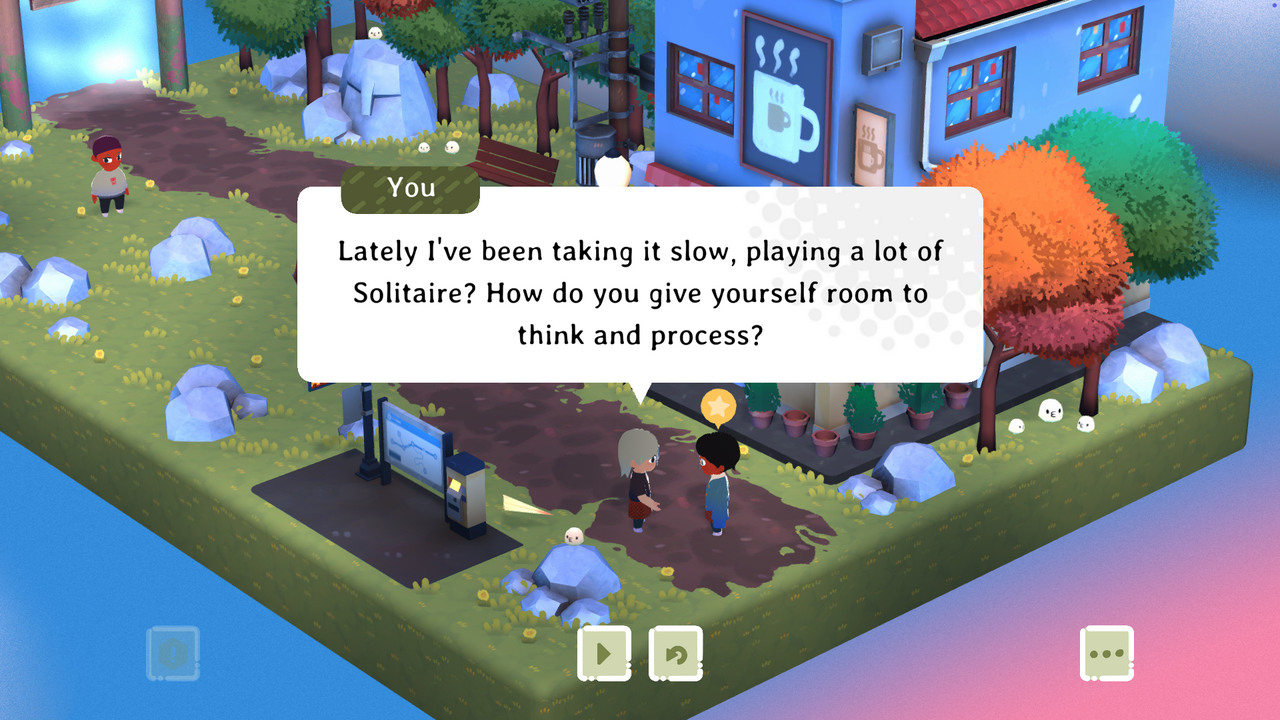
If April is the cruelest month, November might be the most contemplative. Today I played a little Solitaire, a little Snood, and several rounds of Shenzhen Solitaire, lost in thought.
I was finally firing up Kind Words: lofi chill beats to write to when a pop-up notified me that its sequel, Kind Words 2 (lofi city pop), had been released. I’d intended Kind Words 2 to be a day-one purchase, but time got away from me (it was released a little over a year ago, October 2024).
So I bought and installed Kind Words 2 at last, and I am very impressed with this sequel.
The original Kind Words, first released in the summer of 2019, is simple enough: your agender elven chibi avatar sits at a little writing desk in an isometric, box-shaped bedroom, like a dormitory room that kind of floats in the void of space. Lo-fi music plays in the background, riffing on the then-newish concept of “beats to relax/study to.” This idea of a dedicated, soothing virtual space for productivity or concentration has since appeared in standalone and web applications like Virtual Cottage and Spirit City: Lofi Sessions (for effective body doubling), as well as Flocus and Wonderspace. (Ghibli-pilled vaporwave cottagecore is the aesthetic of choice for tortured work-from-home university students, who tend to refer to this complicated audiovisual aesthetic as “aesthetic.”)
From the safety of isolation at your desk, you can anonymously reply to “Requests”—that is, anonymous notes seeking advice or support. Sending a ‘good’, helpful reply is only mildly incentivized: grateful recipients cannot continue the conversational exchange, but they can gift you a “sticker” in return. As your sticker sheet fills up, little decorative objets d’art—plushies or other collectible figurines—appear in your room.
On ‘down’ or ‘blue’ days I’ve never sent a request, but I’ve compulsively answered them. It’s a low-stakes way to feel useful, connected, without the investment or commitment of full-fledged friendship.
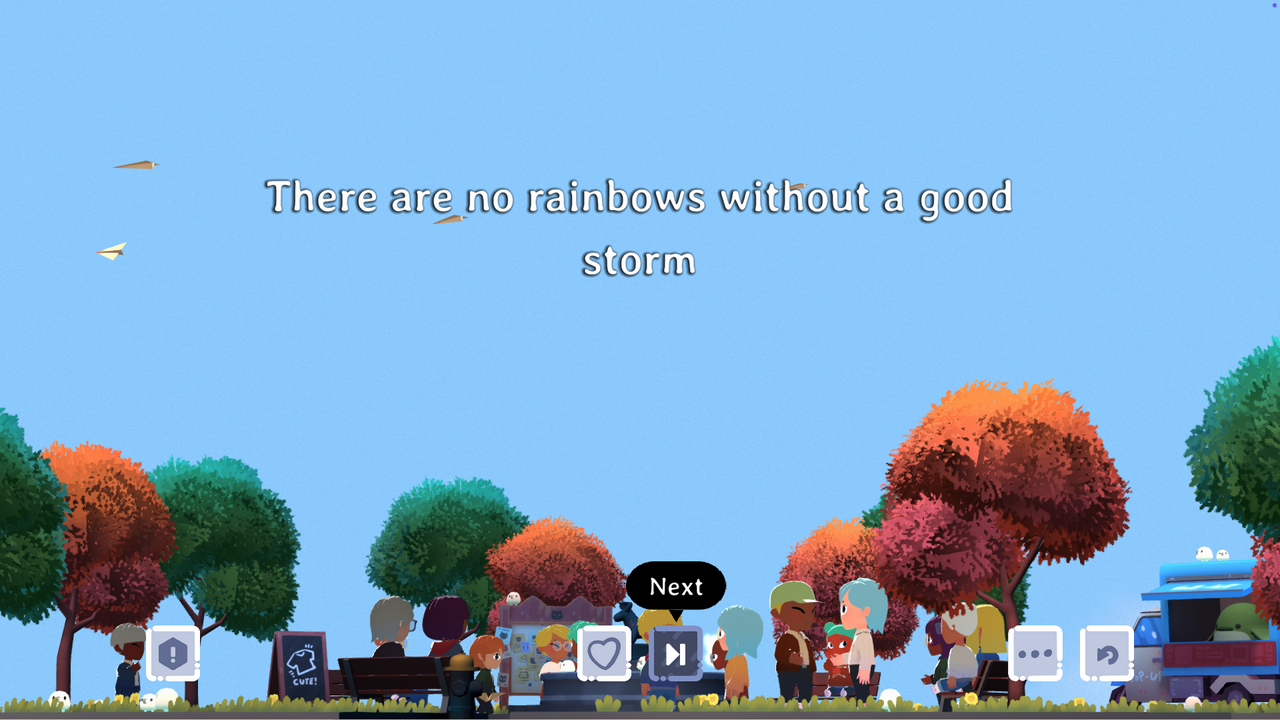
Sitting on a bench in Kind Words 2.
“Paper airplanes” also perpetually drift by, and you can click on one to unfold and read it. Paper planes are intended for transmitting one-off confessions or ‘deep thoughts’, but tend instead to contain adages or other general words of support.
It’s an issue that plagues the original Kind Words. The streams of both types of messages—both “requests” as well as “paper planes”—often become clogged with more frivolous or whimsical bids for human connection.
In a slump of boredom or numbness, people might tend to request recommendations for movies, books, TV shows, games, music. Or else they might post haiku, or issue a little plea to the universe. And jokes—people have jokes! There’s a “Report” button in the corner, but using it to flag off-topic posts feels absolutely insane.
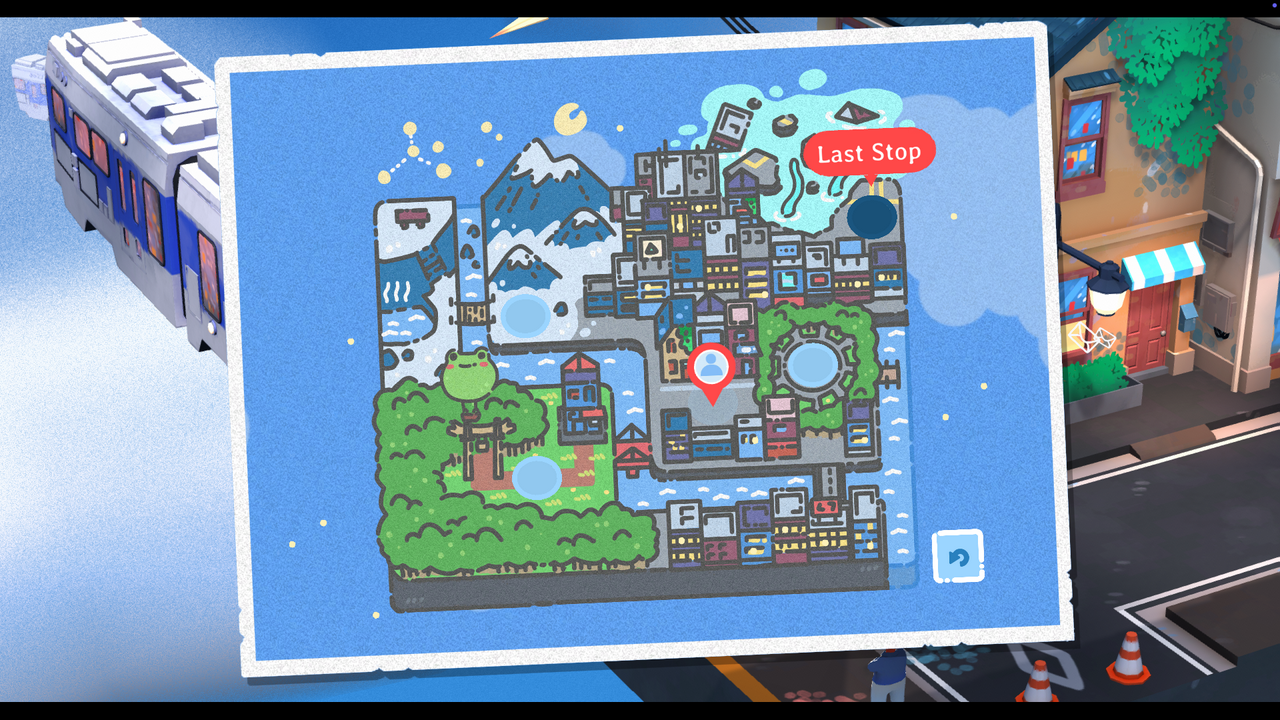
A map of the city (Kind Words 2).
This glut of misfiled missives has been corrected in Kind Words’s sequel. Instead of fighting the way people gravitate toward using Kind Words, the developers created wholly new locations where these types of messages can be sent and received. Lately I’ve been thinking anew about the psychological architecture of virtual spaces; the developers have charted an entire emotional map.
Your save data from Kind Words—stickers, bedrooms, bedroom decor, plus previously-favorited paper airplanes—carries over to the sequel. The interior bedroom art is the same; music from the previous installment still plays in the background. Quite literally nothing has been lost.
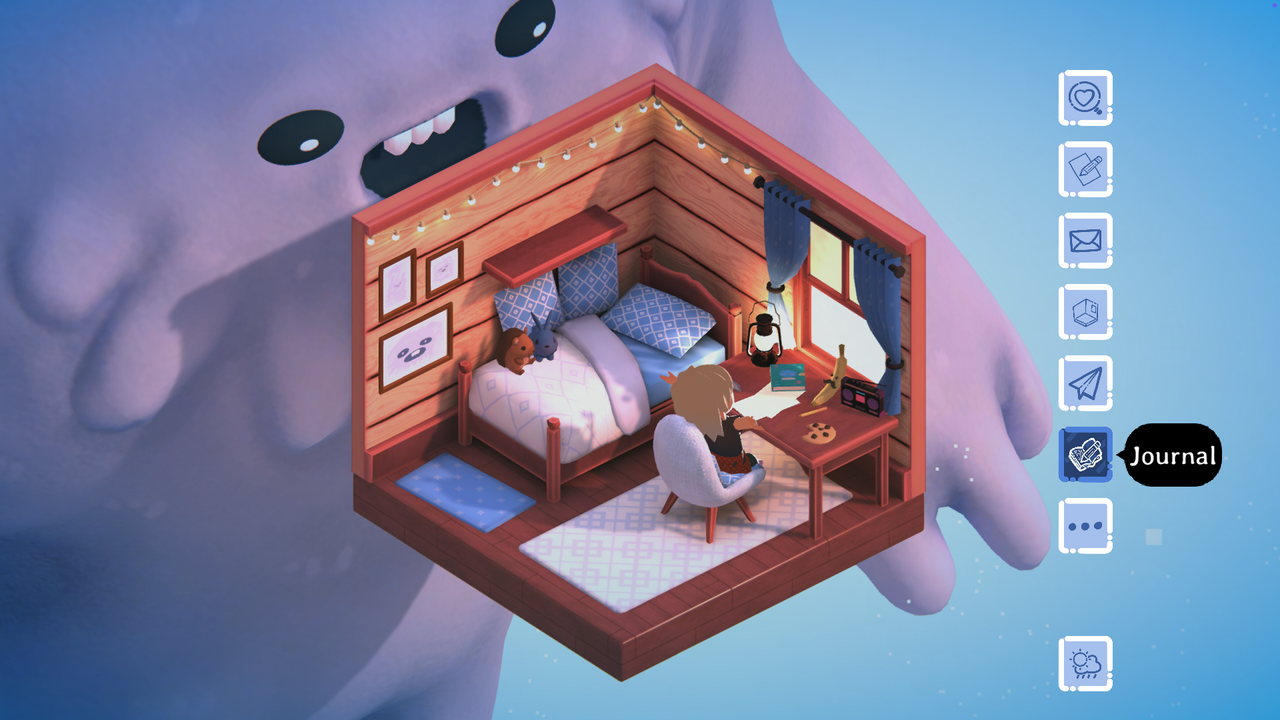
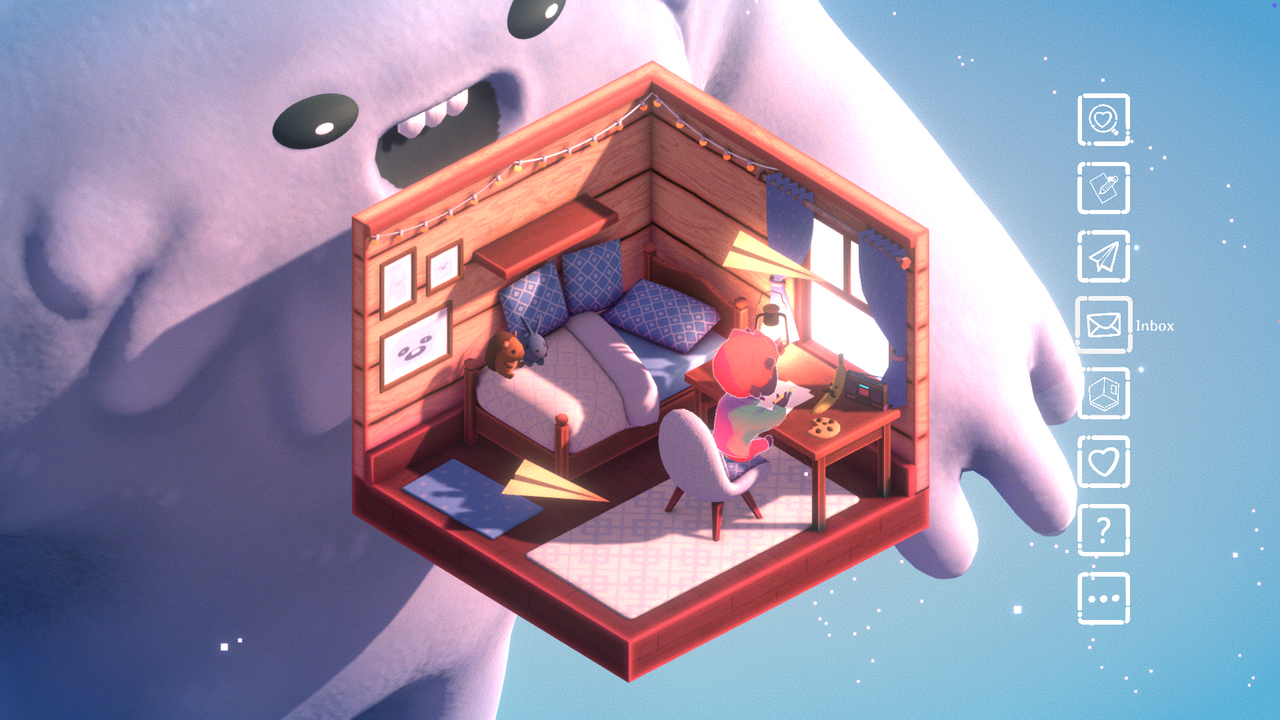
The first image is Room 4 from Kind Words 2; the second image, for comparison, is from the original Kind Words, version 2023.09.10. I was checking to see if the “private journal” option were a new thing; it is.
This time, though, you can stand from your familiar writing desk and “Go Outside.” Doing this for the first time felt like the opposite of Labyrinth, when Jennifer Connelly opens her bedroom door onto a weird snowy void. Instead, your bedroom door opens onto a bustling main street. Exhilarating! (“It’s a social space with no followers, no likes, no subscribing,” according to Kind Words’s official website.)
Here, at “Home,” you will find other avatars waiting to “Chat.” Chats are anonymous and asynchronous, like a long-distance chess game of short conversation. Paper planes float past as before, can be uncrumpled and opened; sitting your avatar on a bench stares you up at the sky to read a constant feed of ephemeral paper plane thoughts.
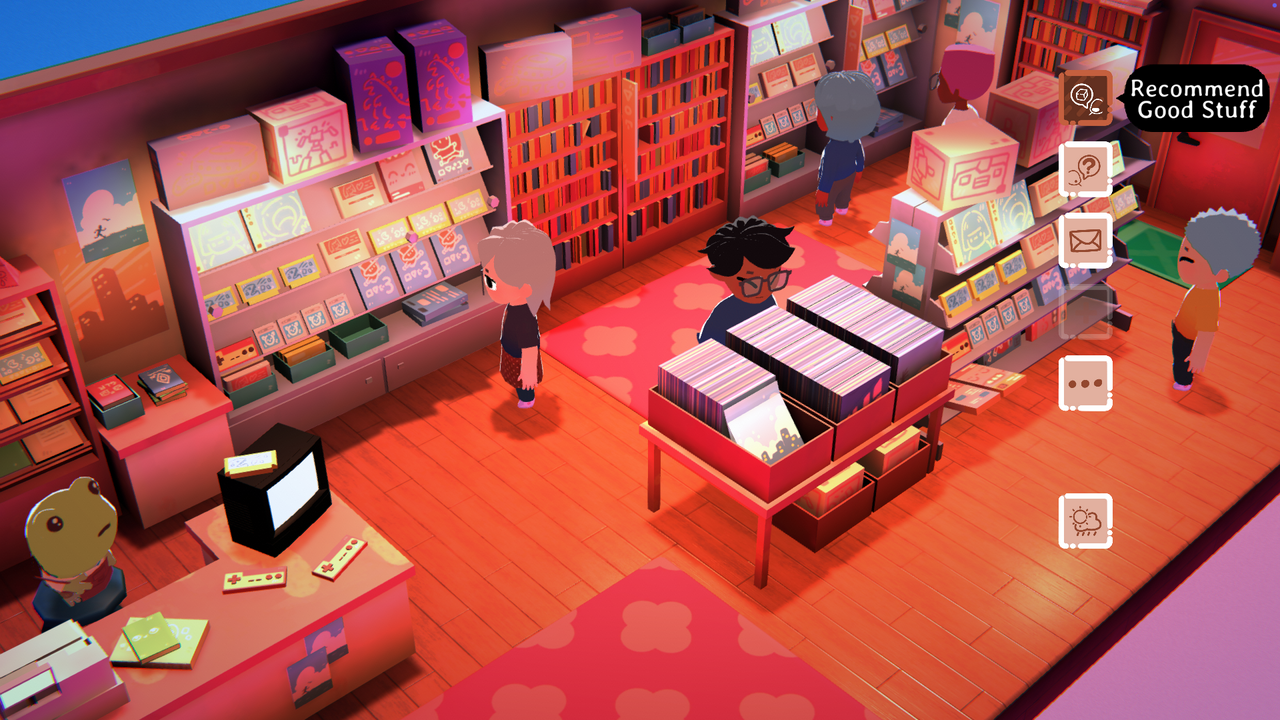
Excavating your inner hipster inside Books & Stuff.
One door down from your brownstone is a clothing shop (for tweaking your avatar) and, beside it, “Books & Stuff,” a ‘vintage shop’ where you can either request recommendations (movies, games, music, currently a certain number of requests for queer vampire media) or flex your exceptional taste by replying. You can also send a paper plane by clicking on the streetside mailbox just outside.
Clicking on the nearby rail stop pulls up the city map, and here is where the magic really happens. From Home, you might naturally choose “Plaza” first. The train deposits you in a park, reminiscent of Wii Plaza, where you can eavesdrop on transcripts of already-completed player Chats. There’s also a hyperspecific bulletin board simply called “Cats!,” where you can either supply a description of a cat, or name the cat based on one of these descriptions, just like T.S. Eliot would do. (Gosh, he is really everywhere.) My cat recently passed away, so I could not look at this for very long.
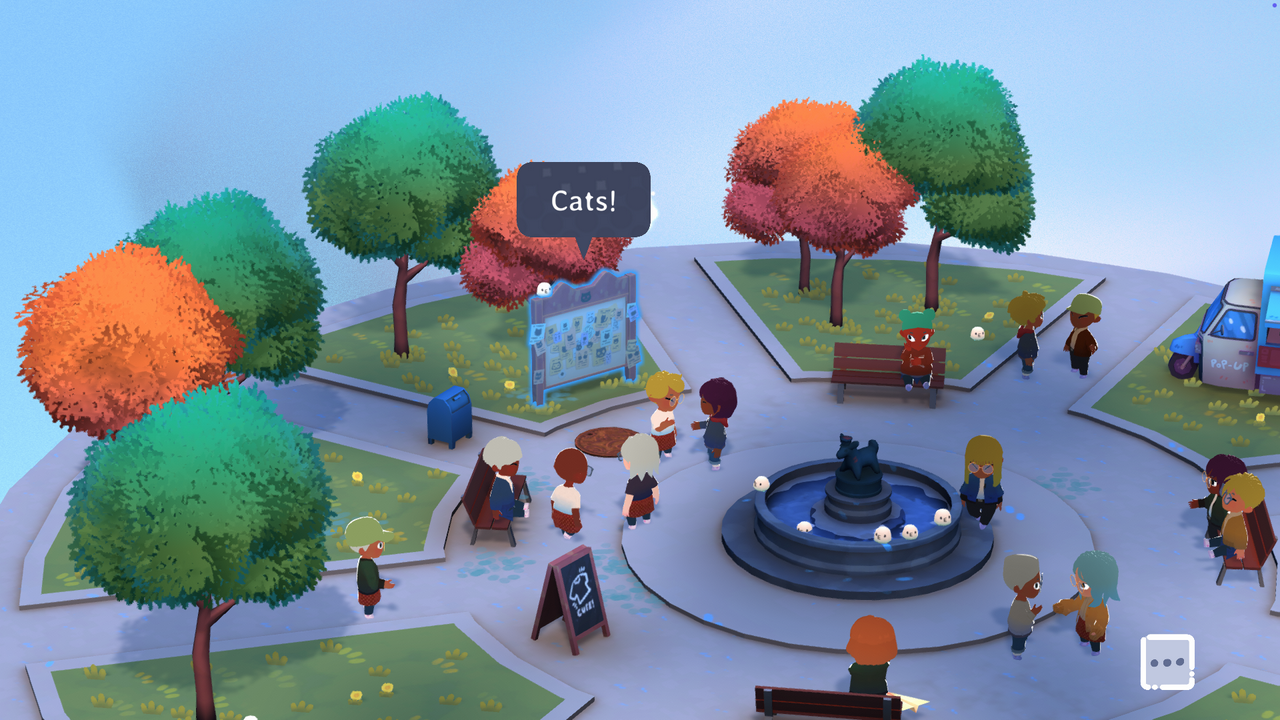
The Plaza.
Then you might take the train over to “Outskirts.” Going into the Café seats you at an open mic, where you might choose to either “Listen” or “Share a Poem,” or else go into the “Poetry Challenges” submenu where you can answer a challenge or, alternatively, issue a writing prompt of your own. Clicking “Listen” sends a little stream of avatars onstage, performing anonymous users’ poems line by line. You might assume it’d all be angsty tripe, but I’ve already favorited a number of beautiful, wistful and/or life-affirming odes, so there.
Outside the Café there is a zen archway leading into a seemingly endless garden called the “Chain Forest.” In the original Kind Words, a lot of paper airplanes contained chain letters, which typically asked visitors to repeat the prompt along with their replies, and “pass it on!” Now chain letters are a place you can explore. And some of the chains are pretty fun! I thought this one was worth recording for posterity.

The Chain Forest.
Another destination is “Snow Mountain.” At the base of this little mountain is a hot spring where you can immerse yourself in others’ sage wisdom. (“Every day, once a day, give yourself a present,” someone recently submitted. I wonder how often this particular Dale Cooper quote turns up here.) After you’ve read three, you can leave your own lifehack, hot tip, or hard-won life lesson.
Just up the path from the spring is “Magic Echo.” I’m too scared to shout (type) anything into it, but here’s the official “Help” description:
You’ve found a strange and cavernous hole. There is no visible bottom.
If you yell into it, you will hear an echo, but not of your voice; you will hear the echo of the person before you.
And the next person will hear the echo of you! Each echo is only ever heard by one person.
At the very peak of the mountain is “Make a Wish,” where your perspective shifts so that you are gazing up at the nighttime arctic sky. Here, you can read others’ wishes for themselves—a constant tickertape of short prayers—and potentially type out a wish of your own.
Finally, there is “Last Stop.” This destination brings you to an empty parking lot. Hovering your cursor over an unmarked storefront indicates that it contains “Memories,” i.e. past favorites and other data that can be exported and browsed. The parking lot crumbles off into a watery expanse, which therein contains some sort of kawaii Lovecraftian blue god—with two eyes and an undulating open mouth—called the “Wiggling Void.” Here, you can type something that will instantly be deleted, which is just my style: tossin’ thoughts into the cosmic maw.
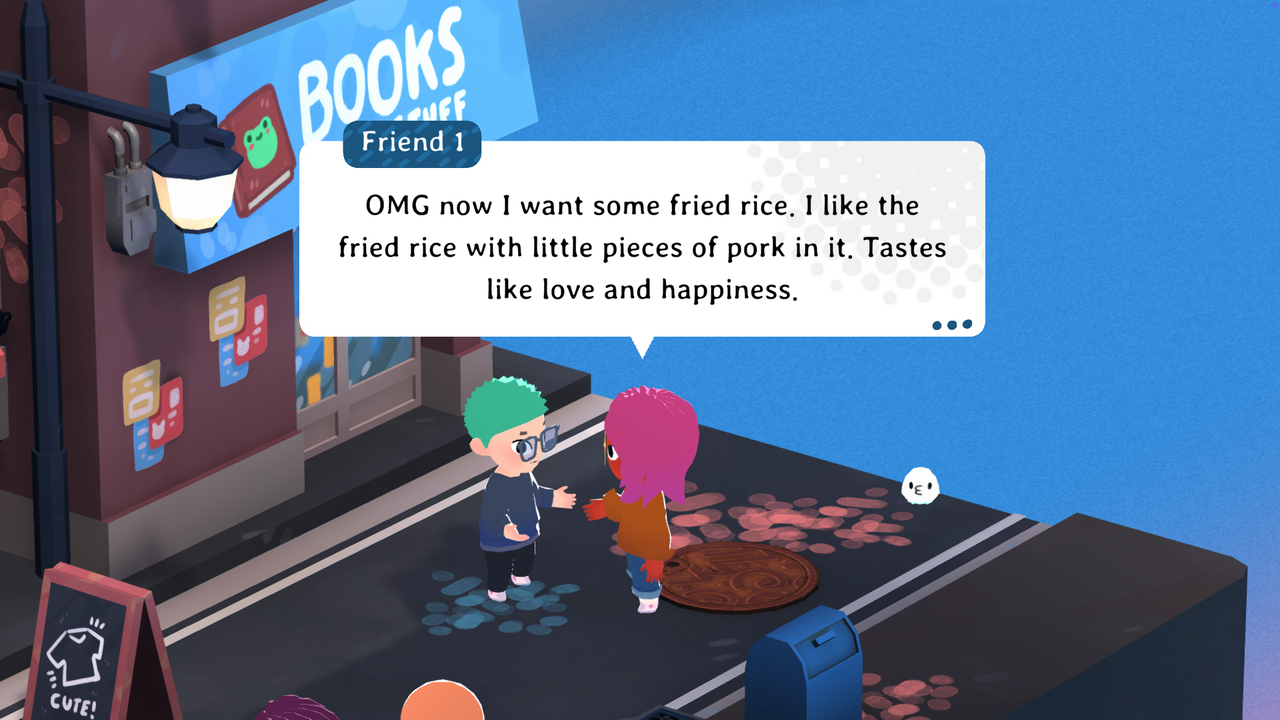
“Listen” invites the player to eavesdrop on short conversations, about 12 lines in length.
I think what strikes me most about Kind Words 2 is that it is a radical undertaking, a disproportionate labor of love, given that the original Kind Words—while rightly award-winning—was a $5 toy. This isn’t to say that the original Kind Words wasn’t expansive; on the contrary, Kind Words 2 simply considers and embraces the way users were naturally inclined to play with the original, building a whole geography around their instincts, mapping their emotional needs onto the terrain. It’s a compassionate feat of both community management as well as urban planning, which are surprisingly similar fields.
Didn’t T.S. Eliot write The Cocktail Party? God, that play wrecked me as a teenager. If John Donne claimed that “no man is an island” (“a piece of the continent, a part of the main”), Eliot was claiming that yeah, no, actually, every man is marooned on his own continent, and that’s the tragedy of contemporary society. There’s reams of literature, and also an entire branch of sociology, about how alienating cities are, and also disorienting, and both pick up right around the start of the Industrial Revolution. Anyway. Kind Words 2 bridges these disparate realities, traveling freely between varying states of connection by light rail.
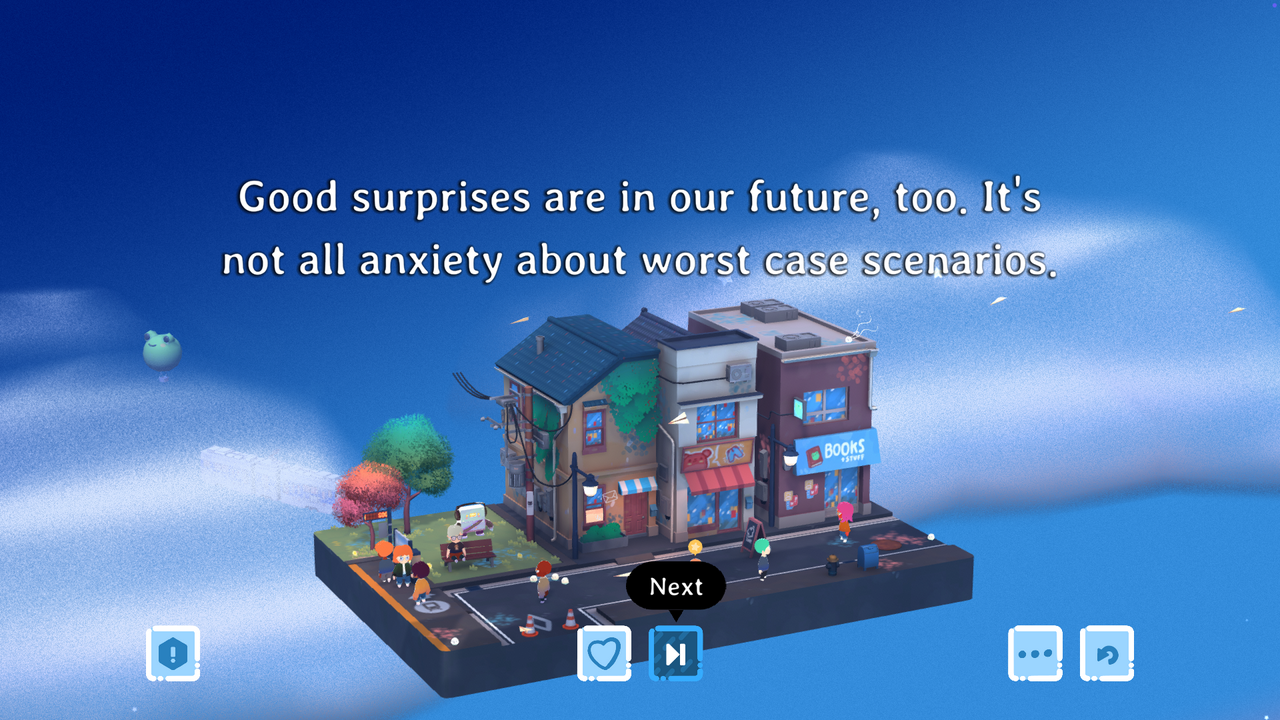
Viewing a reel of paper-plane messages in Kind Words 2.
If I had to fashion an elevator pitch for Kind Words 2, I’d describe it as a mashup between Animal Crossing and the woefully underappreciated mixed-reality sleepytime application Pillow, which launched in November 2023. I guess that doesn’t carry much meaning, since very few people play every piece of software that comes out on a Meta headset, and even fewer put on their headsets right before bed. That’s a weird note to end on; now I’m scrounging around for a clincher of a final paragraph.
But I also don’t want to say exactly what I mean. I don’t want to revisit the thing I spent the latter half of the past month exhaustively writing about—which was, eerily enough, an academic postmortem of a collaborative build, from 2020, of a virtual community/theater metaverse city-island—and I definitely don’t want to talk about chronic illness, or the pandemic, or how we totally had the chance to change the way people digitally meet up and then, as a society, just didn’t.
I do think, often, about cozy virtual community spaces, which people regularly establish and then just as inevitably abandon, except for when they very rarely don’t. I’m still devastated about the loss of Glitch—the developer, Tiny Speck, dropped it to create Slack, a totally different kind of city—although a small team is attempting to revive it using the original assets. There’s also the ImagiNation revival. And there’s Uru Live, the community-maintained Myst MMO of old. And people are still active all over Telnet, which is nice. But these feel like ghost towns.
I guess I’m saying there’s something people keep trying to build, and we haven’t quite gotten there yet: maybe a walkable, accessible city full of third places, but inside the computer, allergen-free. Every time a virtual world tries for canniness—by which I mean a lifelike familiarity—now-conventional game mechanics like “foraging” and “crafting” always get in the way. I mean, I love those things, but I mostly login to FFXIV to stand around. Maybe there’s some MMO (with a companion novelty cookbook, I’d hope!) that I would feel more at home in. Kind Words 2 comes darn close. I don’t know. I don’t even like MMOs that much.
Instead of all that, I will just say that Kind Words 2 is a successful experiment in city planning, and a place well worth visiting on your day off.
Updating to add: You can find a marvelous and much more resonant review, written by somebody else, here.
Kind Words 2 is available for us$20 on Steam (PC, Linux, and macOS). Kind Words 1 is available for us$5 on Steam, itch.io, and Humble Bundle, although save data is (presumably) transferred exclusively through Steam Cloud.